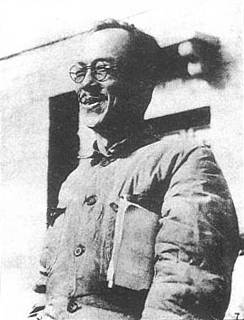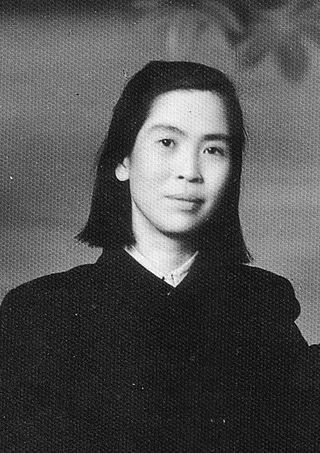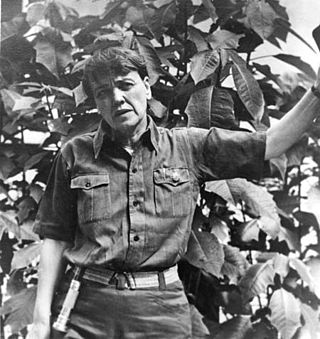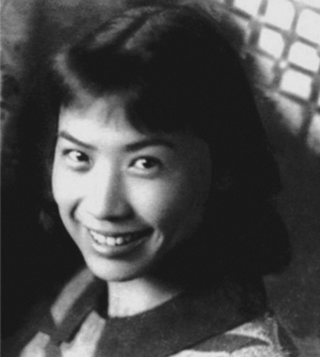
Zhou Enlai was a Chinese statesman, diplomat, and revolutionary who served as the first Premier of the People's Republic of China (PRC) from 1949 until his death in 1976, and concurrently as Foreign Minister from 1949 to 1958. Zhou was key figure in the Chinese Communist Party (CCP) and ally of Mao Zedong during the Chinese Civil War, later helping consolidate its control, form its foreign policy, and develop the economy.

Zhu De was a Chinese general, military strategist, politician and revolutionary in the Chinese Communist Party (CCP).

Kang Sheng, born Zhang Zongke, was a Chinese Communist Party (CCP) official, best known for having overseen the work of the CCP's internal security and intelligence apparatus during the early 1940s and again at the height of the Cultural Revolution in the late 1960s and early 1970s. A member of the CCP from the early 1920s, he spent time in Moscow during the early 1930s, where he learned the methods of the Soviet NKVD and became a supporter of Wang Ming for leadership of the CCP. After returning to China in the late 1930s, Kang Sheng switched his allegiance to Mao Zedong and became a close associate of Mao during the Second Sino-Japanese War, the Chinese Civil War, and after. He remained at or near the pinnacle of power in the People's Republic of China from its establishment in 1949 until his death in 1975. After the death of Mao and the subsequent arrest of the Gang of Four, Kang Sheng was accused of sharing responsibility with the Gang for the excesses of the Cultural Revolution and in 1980 he was expelled posthumously from the CCP.

Zhang Guotao was a Chinese revolutionary who was a founding member of the Chinese Communist Party (CCP) and rival to Mao Zedong. During the 1920s he studied in the Soviet Union and became a key contact with the Comintern, organizing the CCP labor movement in the United Front with the Kuomintang. From 1931 to 1932, after the Party had been driven from the cities, Zhang was placed in charge of the Eyuwan Soviet. When his armies were driven from the region, he joined the Long March but lost a contentious struggle for party leadership to Mao Zedong. Zhang's armies then took a different route from Mao's and were badly beaten by local Muslim Ma clique forces in Gansu. When his depleted forces finally arrived to join Mao in Yan'an, Zhang continued his losing challenge to Mao, and left the party in 1938. Zhang eventually retired to Canada, in 1968. He became a Christian shortly before his death in Scarborough, Ontario, in 1979. His memoirs provide valuable and vivid information on his life and party history.

Li Lisan was a Chinese politician, member of the Politburo, and later a member of the Central Committee.
The 28 Bolsheviks were a faction in the early Chinese Communist Party (CCP). The faction was formed among Chinese Communists studying at the Sun Yat-sen University in Moscow during the late 1920s and early 1930s. They received their nickname because of their strong support for the orthodox political positions advocated by Joseph Stalin and Pavel Mif. The leaders of the faction included Wang Ming, Bo Gu, Luo Fu, He Zishu, Wang Jiaxiang, and Shen Zemin. Sun Yat-sen University closed in 1930 and the students made their way back to China.

He Zizhen was a Chinese soldier, revolutionary, and politician who was the third wife of Chairman Mao Zedong from 1928 to 1937 and participated in the Long March.

Wang Ming was a senior leader of the early Chinese Communist Party (CCP) and the mastermind of the famous 28 Bolsheviks group. Wang was also a major political rival of Mao Zedong during the 1930s, opposing what he saw as Mao's nationalist deviation from the Comintern and orthodox Marxist–Leninist lines. According to Mao on the other hand, Wang epitomized the intellectualism and foreign dogmatism Mao criticized in his essays "On Practice" and "On Contradiction". The competition between Wang and Mao was a reflection of the power struggle between the Soviet Union, through the vehicle of the Comintern, and the CCP to control both the direction and future of the Chinese Communist Revolution.

Agnes Smedley was an American journalist, writer and activist who supported the Indian Independence Movement and the Chinese Communist Revolution. Raised in a poverty-stricken miner's family in Missouri and Colorado, she dramatized the formation of her feminist and socialist consciousness in the autobiographical novel Daughter of Earth (1929).

Sidney Rittenberg was an American journalist, scholar, and Chinese linguist who lived in China from 1944 to 1980. He worked closely with Mao Zedong, Zhu De, Zhou Enlai, and other leaders of the Chinese Communist Party (CCP) during the Chinese Communist Revolution, and was with these central Communist leaders at Yan'an. Later, he was imprisoned in solitary confinement, twice. In his book "The Man Who Stayed Behind", Rittenberg stated that he was the second American citizen to join the CCP, the first being the Lebanese-American Doctor Ma Haide
The 8th Central Committee of the Chinese Communist Party was in session from 1956 to 1969. It was preceded by the 7th Central Committee of the Chinese Communist Party. It held 12 plenary sessions in this period of 13 years. It was the longest serving central committee ever held by the Communist Party.
The 6th Central Committee of the Chinese Communist Party was in session from 1928 to 1945, during most of the Chinese Civil War, and during the Second Sino-Japanese War. It held seven plenary sessions in this period. It was formally preceded by the 5th Central Committee of the Chinese Communist Party. It was the first central committee to have Mao Zedong as a high-ranking member. It was succeeded by the 7th Central Committee.

Li Na, is the daughter of Mao Zedong and his fourth wife Jiang Qing, and their only child together. Her surname is Li rather than Mao, because her father used the pseudonym "Li Desheng" for a period of time during the Chinese Civil War.

Lin Boqu was a Chinese politician and poet. An early supporter of Sun Yat-sen and member of the Tongmenghui, as well as a later participant in the Nanchang Uprising and the Long March, Lin came to be seen as one of the elder statesmen of the Chinese Communist Party.

Sun Weishi was the first female director of modern spoken drama (Huaju) in Chinese history. Sun's father was killed by the Kuomintang (KMT) in 1927, and Sun was eventually adopted by Zhou Enlai, who later became the first premier of the People's Republic of China. While in Yan'an, Sun aroused the enmity of Mao's wife, Jiang Qing, beginning a rivalry between the two that lasted throughout Sun's life until her ultimate death at Jiang's hands. During World War II, Sun lived in Moscow, studying theater. Lin Biao was also in Moscow at the time and proposed to Sun before returning to China in 1942, but Sun rejected him. Lin married another woman, Ye Qun, in 1943. Ye held a lifelong grudge against Sun for her earlier relationship with Lin.

Xiao San was a Chinese poet and translator. He was fluent in Russian, French, German, and English.
Wu Lili, also known as Wu Xuanchen, Lily Wu or Wu Guangwei, was a translator and English teacher of Mao Zedong.

Chen Changhao (simplified Chinese: 陈昌浩; traditional Chinese: 陳昌浩; pinyin: Chén Chānghào; 18 September 1906 – 30 July 1967) was a member of the 28 Bolsheviks and an important military figure of Zhang Guotao's 4th Red Army from Hanyang, Wuhan. Chen had also been known as Cangmu.

Zhang Qinqiu was a Chinese Communist revolutionary, military commander, and politician. She was one of the first female members of the Chinese Communist Party, and one of the 28 Bolsheviks trained in Moscow. A high-ranking commander of the Fourth Front Army of the Chinese Red Army during the Long March, she is often considered the only woman general of the Red Army. After the founding of the People's Republic of China, she served as Deputy Minister of Textile Industry. She was persecuted during the Cultural Revolution and committed suicide in 1968.

Liu Siqi, also known as Liu Songlin (刘松林), was the wife of Mao Anying, the first son of Mao Zedong.
















